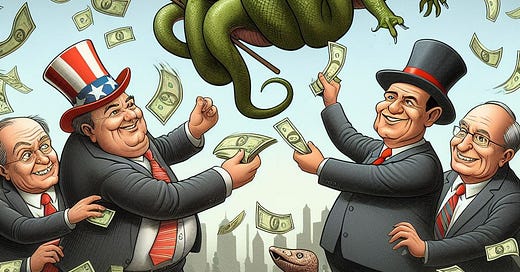Republicans Support Democrats’ Fiscal Insanity—Again
Republicans have to start acting like Democrats, not voting like them.
So, … another day, another deal to avert a partial government shutdown by spending more of present and future taxpayers’ hard-earned money. The temporary spending (“stopgap”) bill the Republican-“controlled” House of Representatives passed on Thursday is designed to keep federal agencies in operation while the House and Senate work on proper appropriations bills.
The bill passed 320-99, with just over half of the House Republicans voting in favor. Nearly all Democrats voted yes. The bill needed approval by two-thirds of those voting.
House Speaker Mike Johnson and other congressional leaders say they have reached agreement on six of the twelve appropriations bills, and the stopgap bill will give them time to carve up the taxpayers finish the rest of them this month.
“The final contents of the bills are not yet clear, though it appears that the bills will not feature the big conservative policy wins House Republicans were pushing for,” Roll Call noted. (That’s some understatement.) “[Senate Majority Leader Chuck] Schumer said Thursday that the package would not include ‘unacceptable poison-pill riders that we said would not fly.’”
You can be sure of that. Democrats do not back down from a fight when it comes to spending other people’s money.
Note that things Republicans want are “poison.” I’m still waiting for Republicans to start referring to Democrats’ spending priorities as “heroin” or “fentanyl.”
In the face of such withering criticism (sarcasm note), “‘All we seem to offer is low energy and low [testosterone] in the face of these mounting challenges,’ Rep. Matt Gaetz, R-Fla., said,” Roll Call reported. Gaetz earns an A for accuracy on that one.
Note that things Republicans want are “poison.” I’m still waiting for Republicans to start referring to Democrats’ spending priorities as “heroin” or “fentanyl.”
Congressional leaders say that the appropriations bills will reflect the overall spending level agreed to in last year’s debt ceiling deal. That agreement set a cap of 1 percent on spending increases for the 2025 fiscal year. The FY2024 federal budget deficit is forecast to be $1.846 trillion, out of a budget of $6.883 trillion, meaning approximately 27 percent of the budget is already deficit-financed. This deal will not exactly improve the situation.
In last year’s debt ceiling fight, you might recall, “Some Republican lawmakers had insisted on deep cuts laid out in a bill passed by the House in April, which would have rolled back spending levels to fiscal 2022 and then capped growth at 1% for a decade,” as The Wall Street Journal reported at the time. “Democrats had called those cuts a nonstarter.”
And because Democrats have nerve and stand for something—impossible, irrational, irresponsible, unsustainable government spending—they got a deal that increased the budget bloat.
Within that debt ceiling deal, however, was a provision requiring a 1 percent cut in federal spending if any of the appropriations bills did not get passed by an agreed-upon deadline (originally set for the end of 2023). The legislation the House passed averts those cuts, if the Senate agrees and President Joe Biden signs the legislation, as they surely will.
The Democrats were willing to stick to their guns and force a government shutdown, all to stave off a measly 1 percent spending cut. The Republicans were not willing to risk anything to get even a largely symbolic 1 percent cut in spending.
Kudos to the 97 Republicans who voted no. I don’t know what the two Democrats who voted no were thinking. They probably thought the bill does not spend enough.
The Democrats were willing to stick to their guns and force a government shutdown, all to stave off a measly 1 percent spending cut. The Republicans were not willing to risk anything to get even a largely symbolic 1 percent cut in spending.
As a result of this deal, the federal deficit will surely increase, the federal debt will balloon further, payments on the government debt will cost even more than they do now, and the massive weight of the federal government on the nation’s economy will increase.
A local television station’s news program referred to this latest budget deal as “a crisis averted.” It may be that in political terms, but it is only going to add to the federal budget crisis.
This is what the U.S. press call governing responsibly. It is in fact what people who have mastered simple arithmetic call fiscal insanity.




